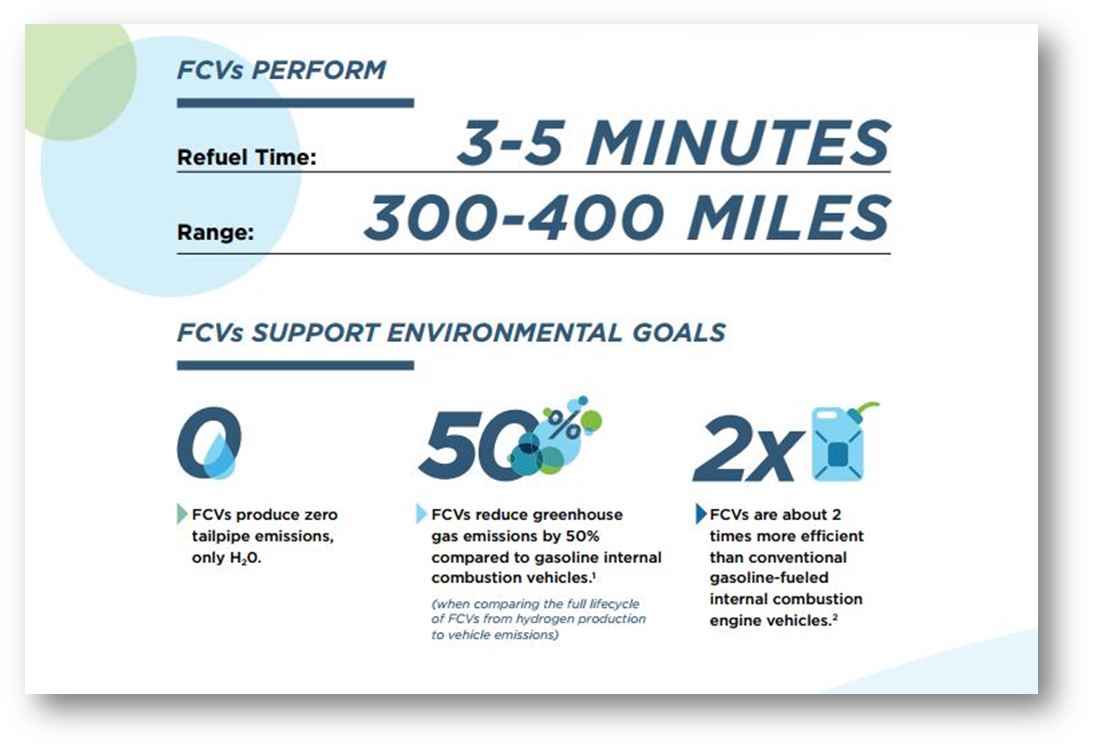Consumers are reluctant to compromise on convenience, power, range or safety to support zero emissions vehicle (ZEV) mandates set out by ZEV States. Automakers understand this, as noted by an advanced technology manager of a leading manufacturer, “If society’s goals are to reduce carbon from the transportation side, they only have a few options and from our point of view, [hydrogen] is the most compelling one.”[i]
Furthering this idea, zeroemissions.org provides fuel cell vehicle (FCV) facts to support the idea of zero emissions with zero compromise.
Costs have reduced by more than 50% for automotive fuel cells since 2006, and their durability has more than doubled.[ii] Fuel cell vehicles (FCVs) provide the high torque of battery electric cars with an extended drive range of 300-400 miles, while offering the ability to fill up a tank in just 3-5 minutes.
Compromising on safety is not an option, and hydrogen FCVs are considered as safe, if not safer, than gasoline cars. “It’s safer than liquid fuels in automotive applications,” points out Marty Gresho, a firefighter, engineer and member of the NFPA’s hydrogen code committee, for a Huffington Post article on hydrogen stations coming to New York City. “Gasoline vapors tend to hang around on the ground, meaning any ignition could result in a ground fire right below a vehicle that could envelope it. Hydrogen is so buoyant that it can’t practically accumulate outdoors… you can’t really have a pool fire, because the hydrogen won’t hang around, which is a good thing; it just leaves. That’s a big safety difference.”[iii] In a related article, Robert J. Davidson, a former fire marshal turned hydrogen safety expert and founder of Davidson Code Concepts suggests, “Hydrogen is safer than gasoline, propane or compressed natural gas,” and emphasizes that, “anyone familiar with the modern standards understands this.”[iv]
FCVs meet the National Highway Safety Transportation Administration’s strictest safety and quality standards, and offer the fast-fueling convenience of hydrogen. Nuvera Fuel Cells, a member of the Fuel Cell & Hydrogen Energy Association, invites you to learn more about the growing FCV market, fuel cells, and hydrogen safety at www.zeroemissions.org.
[i] Muoio, Danielle. “Why Hydrogen Powered Cars Are Better.” www.businessinsider.com. http://www.businessinsider.com/why-hydrogen-powered-cars-are-better-2016-1 (accessed November 2, 2016)
[ii] “Fuel Cell Technologies Office Accomplishments and Progress.” Energy.gov. http://energy.gov/eere/fuelcells/fuel-cell-technologies-office-accomplishments-and-progress (accessed November 2, 2016)
[iii] Kite, Shane. “Hydrogen Stations Coming to Brooklyn, the Bronx, as NYC Seeks Top Role in Zero-Emissions Transportation.” www.huffingtonpost.com. http://www.huffingtonpost.com/entry/hydrogen-stations-coming-to-brooklyn-the-bronx-as_us_57ebd461e4b07f20daa0ffd7 (accessed November 2, 2016)
[iv] Kite, Shane. “The Transportation Future is Under Construction in Hartford.” www.huffingtonpost.com. http://www.huffingtonpost.com/shane-m-kite/post_11632_b_9755568.html (accessed November 2, 2016)
